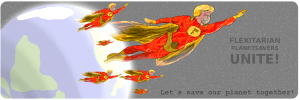A new kind of messaging could make it easier for people to appreciate the enormous benefits of moving away from a meat-heavy diet.
I recently wrote a guest blog for Scientific American. In this piece I argue that we need to rethink how we communicate about meat consumption reduction, which is one of the most effective ways to tackle climate change. As my own research shows, people still don’t get the link between meat consumption and climate change. In order to get this message across, we need to understand the different worldviews in society. To me, this is compassion-in-action: instead of judging people who think differently, we try to understand how they think, and why they think the way they think. From that place of understanding of, and resonance with, the perspectives of others, we can start to communicate in a whole different manner.
In the first place, this means we need to move beyond what I in the guest blog call ‘finger raising tactics.’ For most committed carnivores, “guilt-tripping” them won’t work. The only thing that will do is create shame and stigmatization and activate psychological dynamics of denial and downplay ~ exactly the thing we don’t need more of.
Instead, we need an inspiring, uplifting, and empowering narrative about the impact of our diets. The good thing is, the situation around meat is empowering, as it puts the power back in our own hands (and mouths): We are not at the mercy of the system, but have substantial influence ourselves. Likewise, it is uplifting that the most effective way for individuals to do their part tends to also lead to better health, weight control, creativity in the kitchen, and animal welfare.
According to research, people in industrialized countries consume on average around twice as much meat as experts deem healthy. In the US the multiple is nearly three times. Adoption of a healthy diet would therefore generate over a quarter of the emission reductions needed by 2050! Isn’t that uplifting?! Moreover, many of us have had the inspiring experience of a whole new world opening up once we stopped centering our meals around meat: we start experimenting, discover new vegetables and ingredients, and generally become more creative in our cooking. In other words, it is fun and can lead to surprising, colorful, and delicious results!
So while environmental behaviors often involve sacrifices, the meat-reduction option offers a range of inspiring and empowering personal benefits. How would communications and campaigns look if they would emphasize that?
Read the full guest blog @ Scientific American.

Credit for image: Concept by Lena Johanning, design by Rutger Cox.

